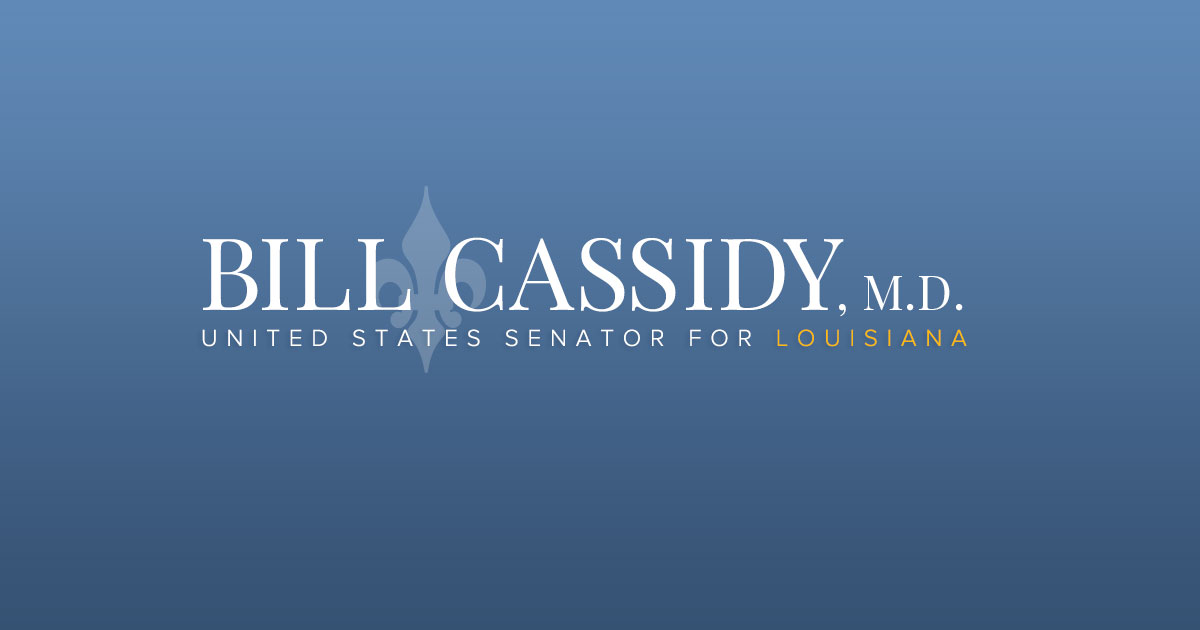Source: United States Senator for Louisiana Bill Cassidy
07.14.21
WASHINGTON – U.S. Senators Bill Cassidy, M.D. (R-LA) and Bob Menendez (D-NJ) introduced the bipartisan Seniors Prescription Drug Relief Act to strengthen Medicare Part D and make it easier for seniors to afford their medication.
“If someone on Medicare cannot afford their medication, they are going to get sicker or not get better. This bill takes on the root causes of high drug prices because we want to make it easier for seniors to pay for their prescriptions,” said Dr. Cassidy.
“Our bipartisan bill would put patients and consumers first by providing seniors with real financial relief at the pharmacy counter to ensure that those who rely on expensive medications aren’t saddled with insurmountable prescription drug bills at the start of every year,” said Senator Menendez. “Setting a cap on out-of-pocket expenses allows seniors to prorate their share over the year into set monthly payments, giving them more flexibility to cover their health care expenses. Policies like this, that deliver savings to the consumers, must be central to our continued work on making drugs more affordable for the American people.”
For seniors, the bill establishes a new out-of-pocket cap on catastrophic coverage, so that beneficiaries would have no costs after reaching $3,100 in out-of-pocket spending. Seniors who reach that limit early in the calendar year could spread their payments over the course of the year, to help those on fixed incomes or who would otherwise struggle to pay their entire obligation in a lump sum. The bill would also reduce coinsurance from 25 to 20 percent in the initial coverage period, after patients meet their deductible but before they reach the catastrophic cap.
The Seniors Prescription Drug Relief Act would also redesign Medicare Part D’s benefit structure to realign these flawed incentives and lower the cost of prescription drugs. Medicare Part D spending is growing substantially, especially in the benefit’s catastrophic phase, which begins once beneficiaries have spent more than $6,550 out-of-pocket. Part of the problem is that the program’s misaligned financial incentives encourage growth in specialty drug prices. Under current law, drug manufacturers do not have strong incentives to keep prices low and insurers benefit when high prices move beneficiaries quickly into the catastrophic phase, where Medicare subsidizes 80 percent of the cost. Seniors are pinched by these high prices, which can severely limit their access to expensive medications.
This legislation would reduce the taxpayer’s responsibility for Part D spending, so that insurance plans and drug manufacturers have more skin in the game. This will encourage plans to better negotiate for lower drug prices and better formulary placement, and ensure that when drug prices rise, so does the drug-maker’s financial responsibility. The bill would ensure that the ability for small manufacturers to conduct research and development is not unduly disrupted. These companies may have just one or two products on the market and typically are in high-risk research areas like serious mental illness.
“Senators Cassidy and Menendez continue to provide critical leadership to ensure Medicare patients can afford and access needed care. The Alliance for Aging Research thanks the Senators for their efforts to advance patient affordability in Medicare Part D through this bill,” said Alliance for Aging Research Vice President of Public Policy Michael Ward.
“The Seniors Prescription Drug Relief Act includes landmark reforms that would dramatically lower prescription drug costs Medicare patients experience far too often,” said The Leukemia & Lymphoma Society Chief Medical Officer Dr. Gwen Nichols, M.D. “These reforms would limit upfront costs for patients who rely on costly prescription drugs and cap the amount enrollees pay over the course of the year—two changes that will give a much-needed break to American seniors. Today, blood cancer patients on Medicare Part D often pay more than $3,000 for their first prescription of the year, with annual out-of-pocket costs sometimes higher than $15,000 for a single cancer therapy. Under the Seniors Prescription Drug Relief Act, these same patients would see their Part D costs reduced to less than $260 per month. On behalf of the 1.3 million Americans living with a blood cancer diagnosis, The Leukemia & Lymphoma Society applauds Senators Bill Cassidy and Bob Menendez for their leadership on this critical issue, and we urge Congress to pass these solutions this year.”
###
